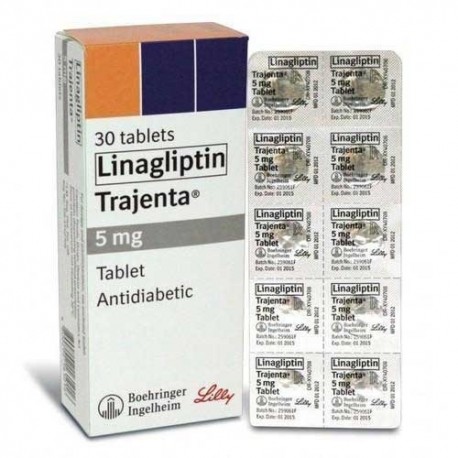 View larger
View larger Trajenta (Tradjenta) Linagliptin 5 Mg 30 Film Coated Tablets
TRJ3302
New product
BUY MORE PAY LESS
| Quantity | Discount | |
|---|---|---|
| 2 | 5% | |
| 3 | 10% | |
| 4 | 15% | |
| 5 | 20% |
Volume discounts
| Quantity | Discount | You Save |
|---|---|---|
| 2 | 5% | Up to $6.50 |
| 3 | 10% | Up to $19.50 |
| 4 | 15% | Up to $39.00 |
| 5 | 20% | Up to $65.00 |
More info
TRAJENTA (TRADJENTA) 5 mg film-coated tablet
It is used orally.
Active ingredient
Contains 5 mg of linagliptin.
Excipients
Tablet core: Mannitol, pregelatinized starch, corn starch, copovidone, magnesium stearate
Film coating: Hypromellose, titanium dioxide (El71), talc, macrogol, iron oxide red (E 172)
¡This drug is subject to additional monitoring. This triangle will enable rapid identification of new safety information. You can help by reporting any side effects that occur. See the end of Chapter 4 for how to report side effects.
1. What is TRAJENTA (TRADJENTA) and what is it used for?
TRAJENTA (TRADJENTA) contains the active ingredient linagliptin and belongs to a group of drugs called "oral antidiabetics". Oral antidiabetic drugs are used by mouth to treat high blood sugar levels. These drugs help lower blood sugar levels in your body.
TRAJENTA (TRADJENTA) is used in adult patients with Type 2 diabetes if the disease cannot be adequately controlled with diet and exercise alone or with one of the oral antidiabetic drugs (Metformin or sulfonylureas). TRAJENTA (TRADJENTA) can be used together with other antidiabetic drugs (Insulin, metformin or sulfonylurea drugs (Ex: Glimepiride, glipizide)).
It is very important that you follow the diet and exercise recommended by your doctor.
TRAJENTA (TRADJENTA) is a round, light red film-coated tablet with a diameter of 8 mm, debossed with “D5” on one side and the Boehringer Ingelheim logo on the other. TRAJENTA (TRADJENTA) is presented to the market in blister packs containing 30 tablets.
2. How to use TRAJENTA (TRADJENTA)?
Always use your medicine as your doctor has told you. If you are unsure about something, ask your doctor or pharmacist.
The recommended dose of TRAJENTA (TRADJENTA) is 5 mg once daily. You can take this medicine on an empty or full stomach.
Your doctor may want you to use TRAJENTA (TRADJENTA) with another oral antidiabetic medicine. In order to achieve the best results for your health, do not forget to use all your medicines exactly as your doctor has recommended to you.
different age groups
Use in children
This drug is not recommended for use in children and adolescents under 18 years of age.
Use in the elderly
Experience in patients over 80 years of age is limited.
Special use cases
Kidney failure:
No dosage adjustment is necessary in patients with renal impairment.
Liver failure
There is no clinical experience in these patients.
If you have the impression that the light effect of TRAJENTA (TRADJENTA) is too strong or too weak, talk to your doctor or pharmacist.
4. What are the possible side effects?
As with all medicines, there may be side effects in people who are sensitive to the substances contained in TRAJENTA (TRADJENTA). However, these side effects do not occur in everyone who uses it.
If any of the following occur, stop using TRAJENTA (TRADJENTA) and IMMEDIATELY inform your doctor or go to the nearest hospital emergency department.
Shivering, sweating, anxiousness, blurred vision, trembling lips, pallor, changes in behavior or confusion. These symptoms occur when blood sugar levels drop. Hypoglycaemia is a side effect observed during concomitant use of TRAJENTA (TRADJENTA) with metformin and a sulfonylurea. Its incidence is defined as “very common” and means that it occurs in more than 1 in 10 people who use TRAJENTA (TRADJENTA) in combination with two other drugs.
Allergic effects have occurred in some patients (Hypersensitivity. Frequency: Unknown). Allergic effects, including wheezing and shortness of breath (Bronchial hyperactivity. Frequency: Not known), may be serious. Skin rashes (Frequency: Uncommon), urticaria (Hives. Frequency: Rare) and swelling of the face, lips, tongue and throat (Angioedema. Frequency: Infrequent) have been observed in some patients, causing difficulty in breathing and swallowing.
These are all very serious side effects.
If you have any of these, you have a serious allergy to TRAJENTA (TRADJENTA). You may need emergency medical attention or hospitalization. Your doctor may give you a medicine to treat these allergic effects and may change the medicine you use to treat your diabetes.
Inflammation of the pancreas (Pancreatitis. Frequency: Unknown) has been observed in some patients. If you have severe and persistent stomach pain with or without vomiting, contact your doctor immediately, as this may be due to pancreatitis.
Some patients taking TRAJENTA (TRADJENTA) alone have experienced the following side effects:
Uncommon (may affect up to 1 in 100 users).
- Inflammation of the nose or throat (Nasopharyngitis),
Cough
Increased blood amylase levels
Not known (cannot be estimated from the available data):
Allergic effects (Hypersensitivity)

